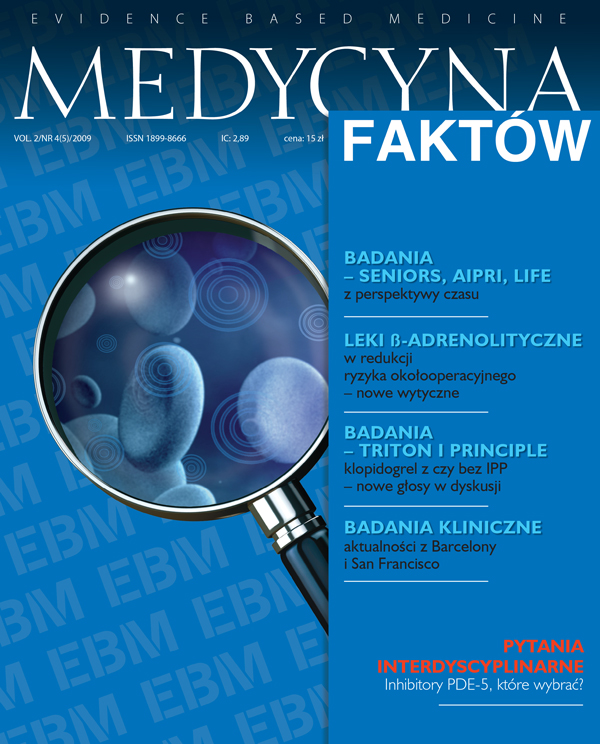Proton pump inhibitors and antiplatelet drugs interactions from perspective of TRITON-TIMI 38 and PRINCIPLE-TIMI 44 trials Review article
Main Article Content
Abstract
The necessity of using by patients after acute coronary syndrome or/and percutaneous coronary intervention both aspirin and clopidogrel for 12 month sometimes with anticoagulant treatment (warfarin, acenocumarol) is associated with increased risk of haemorrhages . Proton pump inhibitors (PPI) are used in treatment or preventive treatment injury of tunica mucosa upper part of gastrointestinal tract associated with using aspirin or non-steroidal anti-inflammatory drug. However, several studies have raised concerns that many PPI’s might diminish the antiplatelet effects of thienopyridines (clopidogrel or prasugrel) because of being metabolized by the same metabolic path. The analysis of two trials TRITON-TIMI 38 and PRINCIPLE-TIMI 44 did not confirm this hypothesis. Further randomized trials are needed. Daily practice should be supported by experts recommendations.
Article Details
Copyright © by Medical Education. All rights reserved.
References
2. Hirsch A., Windhausen F., Tijssen J.G.P. et al.: Long-term outcome after an early invasive versus selective invasive treatment strategy in patients with non-ST-elevation acute coronary syndrome and elevated cardiac troponin T (the ICTUS trial): a followup study. Lancet 2007; 369: 827-835.
3. Urbański D., Kosior J., Orczykowski C., Tobiczyk J.: Chorzy trudni typowi. Terapia trójlekowa – pech... czy w dalszym ciągu nie potrafimy stosować? Kardiol. Pol. 2008; 66: 1210-1213.
4. O’Donoghue M.L., Braunwald E., Antman E.M. et al.: Pharmacodynamic effect and clinical efficacy of clopidogrel and prasugrel with or without a proton-pump inhibitor: an analysis of two randomised trials. Lancet 2009; 374: 989-97.
5. Wiviot S.D., Antman E.M., Gibson C.M. et al.: Evaluation of prasugrel compared with clopidogrel in patients with acute coronary syndromes: design and rationale for the Trial to assess Improvement in Therapeutic Outcomes by optimizing platelet InhibitioN with prasugrel Thrombolysis In Myocardial Infarction 38 (TRITON-TIMI 38). Am. Heart J. 2006; 152: 627-35.
6. Ho P.M., Maddox T.M., Wang L. et al.: Risk of Adverse Outcomes Associated With Concomitant Use of Clopidogrel and Proton Pump Inhibitors Following Acute Coronary Syndrome. JAMA 2009; 301(9): 937-944.
7. Juurlink D.N., Gomes T., Ko D.T. et al.: A population-based study of the drug interaction between proton pump inhibitors and clopidogrel. CMAJ 2009; 180(7): 713-8.
8. Aubert R.B., Epstein R.S., Teagarden J.R. et al.: Abstract 3998: Proton pump inhibitors effect on clopidogrel effectiveness: The Clopidogrel Medco Outcomes Study. Circulation 2008; 118(18 Meeting Abstracts): S 815-a.
9. Kosensus U.S., Bhatt D.L., Scheiman J. et al.: ACCF/ACG/AHA 2008 expert consensus document on reducing the gastrointestinal risks of antiplatelet therapy and NSAID use: a report of the American College of Cardiology Foundation Task Force on Clinical Expert Consensus Documents. J. Am. Coll. Cardiol. 2008; 52: 1502-17.
10. Early Communication about an Ongoing Safety Review of clopidogrel bisulfate (marketed as Plavix) [online].
11. Bartnik W.: Czy stosowanie inhibitorów pompy protonowej z klopidogrelem jest bezpieczne? – komentarz. Med. Praktyczna 2009; 9(223): 32-38.
12. Imiela J., Opolski G., Rydzewska G. et al.: Konsensus Grupy Roboczej powołanej przez konsultantów krajowych w dziedzinach chorób wewnętrznych, gastroenterologii i kardiologii w sprawie zasad prewencji powikłań żołądkowo-jelitowych z przewodu pokarmowego w trakcie leczenia przeciwpłytkowego. Kardiol. Pol. 2009; 67: 536-538.

